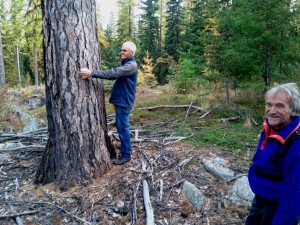
News/Reports
Buck Hills Road Overview: Biological and Physical
ORIGINAL PURPOSE
To conserve a small stand of western larch which includes large, old specimens
Physical:
The reserve is located on the Okanagan Highland, an upland between the Thompson Plateau and Monashee Mountains. The undulating plateau surface is widely mantled with glacial drift. Piles of large, weathered granitic boulders, uncommon in surrounding terrain, are a feature of the reserve, which slopes up gently to the north. A shallow seepage gulley extends through the reserve in a north-south direction.
See the complete PDF: buckhills
Biological:
The major feature is a small stand of western larch, including all ages from seedlings to large mature trees. Most of the latter are associated with boulder piles in the western half of the reserve. The boulder landscape may have protected these trees from fire, allowing mature stands to develop. Other trees here include lodgepole pine, Engelmann spruce, western hemlock, subalpine fir, trembling aspen and black cottonwood. Common understory shrubs in the larch woods are Saskatoon, soopolallie, grouseberry, black huckleberry, black gooseberry and black twinberry. Typical herbaceous species are pinegrass,reedgrass bluejoint, bunchberry, wild strawberry, sweet-scented bedstraw, northern gentian and rosy pussytoes. Common wildflowers include
fairy-slipper orchid, early blue violet and mountain arnica. Northern golden- saxifrage is found here outside of its usual range. A small stream parallels the track through the reserve and provides wetter habitat than the surroundings.
Numerous species of birds have been noted, of which the Great-horned Owl, Saw-whet Owl, Northern Flicker and Red-breasted Nuthatch are reported to nest in the larch trees. The abundance of pikas here is of interest, since this population is well removed from the usual habitat of this species – talus slopes in alpine areas. The boulder piles also provide habitat for the Northern Alligator
Lizard, otherwise of sparse occurrence in continuously forested habitat. Squirrels and chipmunks are common.
SIGNIFICANT SPECIES
Wyeth’s lupine—- Fed Listed
northern golden-saxifrage
American Pika
Northern Alligator Lizard
Threats:
Climate Change: Patterns of disturbance may increase and change with the shifting climate (IPCC), putting the old growth forest specimens and western larch stands at risk of forest fire, storm intensity, and/or insect infestation.
Forestry: Creation of new roads increases access to reserve.
RESEARCH OPPORTUNITIES
One report is available on wildlife and vegetation.
American Pika populations are considered at risk from climate change in alpine habitats. This unique population could be monitored to see how it is affected.
Flora
arnica, mountain (Arnica latifolia)
aspen, trembling (Populus tremuloides)
bedstraw, sweet-scented (Galium triflorum)
bluejoint, reedgrass (Calamagrostis canadensis)
bunchberry (Cornus canadensis)
cottonwood, black (Populus trichocarpa ssp. trichocarpa)
fir, subalpine (Abies lasiocarpa var. lasiocarpa)
gentian, northern (Gentianella amarella ssp. acuta)
gooseberry, black (Ribes lacustre)
grouseberry (Vaccinium scoparium)
hemlock, western (Tsuga heterophylla)
huckleberry, black (Vaccinium membranaceum)
orchid, fairy slipper (Calypso bulbosa)
pine, lodgepole (Pinus contorta var. latifolia)
pinegrass (Calamagrostis rubescens)
pussytoes, rosy (Antennaria rosea)
Saskatoon (Amelanchier alnifolia )
soopolallie (Shepherdia canadensis)
spruce, Engelmann (Picea engelmannii)
strawberry, wild (Fragaria virginiana)
twinberry, black (Lonicera involucrata)
violet, early blue (Viola adunca var. adunca)
Note : Western Larch, Larix occidentalis should be added.
Fauna
Chipmunk (Neotamias spp.)
Flicker, Northern (Colaptes auratus)
Lizard, Northern Alligator (Elgaria coerulea)
Nuthatch, Red-breasted (Sitta canadensis)
Owl, Great-horned (Bubo virginianus)
Owl, Northern Saw-whet (Aegolius acadicus)
Pika, American (Ochotona princeps)
Squirrel, Red (Tamiasciurus hudsonicus

